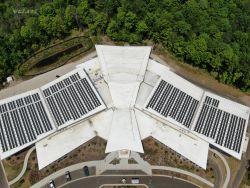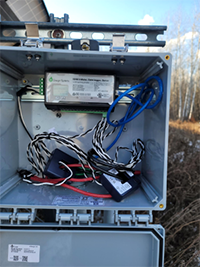The Forest County Potawatomi Community of Wisconsin had been generating electricity to run its community center using solar panels for years—they just didn’t have an accurate way of tracking their energy usage.
Thanks to an Internet for All grant from NTIA, they now do.
“Before the grant, we were generating in the dark. We had no clue what [power] was or was not being generated.” said Jerry Hauber, Energy Manager of the Forest County Potawatomi Community. “Now we can simply log into a system and see if the solar array is generating. And if it’s not, Alex [Lange, Energy Sustainability Specialist] can figure out what’s going on.”
NTIA’s Tribal Broadband Connectivity Program (TBCP) awarded the Forest County Potawatomi Community $125,232 to provide reliable high-speed Internet service to the Tribe’s solar arrays. The broadband component is critical to the success of the project, ensuring that Hauber and Lange can accurately monitor and store data.

The solar panels produce enough energy to charge the building’s energy usage during the day. Before NTIA funded the program, Lange would have to physically drive out to the solar panel site to make sure everything was functioning properly. Data from the solar panels were stored in USBs, which only held 30 days of info. And, with slow download speeds, data collection could take upwards of 2-3 days' worth of time to collect.
To make matters more difficult, their old system was prone to data loss: if the community experienced a power outage, all their data was wiped out of the system. They had also lost their data on one occasion when their data vendor went out of business.
Now that everything goes through their own secure network, the Tribe is no longer dependent on an outside manufacturer or data company to understand how the solar panels on the community center are working, and do not lose any of their data.
Nick Shepard, Forest County Potawatomi Executive Council Member, explained the significance of the community center to their culture and future. “...thayék ėthë dnêkmëgzêk myéw, the place where everybody plays. In that word ‘community’ is ‘unity’, and that’s what this place represents. This is where our elders, our adults, children, babies, can all gather and play together.”
“NTIA helped us to actually understand what that solar is doing for that community center,” said Hauber.

Lange demonstrated how eGauges, small devices used to monitor solar panel wattage, could show him how much energy they produced on any given day and diagnose any issues. The eGauges are connected to the Internet and can back up offline for 90 days—all he has to do is log in to see what’s going on.
The TBCP grant has also created jobs for both deploying and now maintaining the network.
Why Internet for All Matters to Me
Jerry Hauber: “It’s data sovereignty. And sovereignty, whether it be with energy or anything else, is extremely important for the Tribe. It gives us control of our data, which we’ve never had before. And without this grant, we still wouldn’t have it.”
Alex Lange: “It helps build resiliency. Because we own the data and own the infrastructure that’s transmitting it, we’re no longer reliant on a third party for this, or for the future. We are making steps towards the tribe’s energy goals for the future.”
Read More ConnectingUS Stories
Internet For All is already changing lives. Learn more about how increasing access to high-speed Internet service is improving the lives of every day Americans across the country.
Read More ConnectingUS Stories
Internet For All is already changing lives. Learn more about how increasing access to high-speed Internet service is improving the lives of every day Americans across the country.

